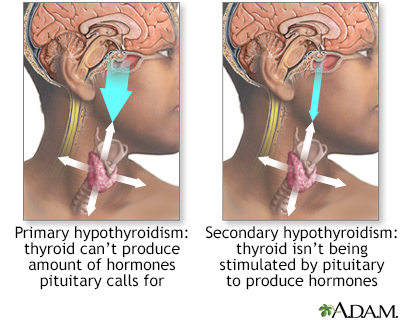Hypothyroidism

What is hypothyroidism?
Hypothyroidism is a condition in which the thyroid gland does not produce enough thyroid hormone, leading to a range of symptoms, including fatigue, weight gain, and dry skin.
Who's at risk for hypothyroidism?
Hypothyroidism can affect people of all ages and genders, but it is more common in women and people over the age of 60. Other risk factors for hypothyroidism may include:
- Family history of thyroid disease
- Previous thyroid surgery or radiation treatment
- Autoimmune disorders, such as Hashimoto's thyroiditis
- Certain medications, such as lithium or amiodarone
What causes hypothyroidism?
Hypothyroidism is caused by an underactive thyroid gland that does not produce enough thyroid hormone. This can be caused by a variety of factors, including autoimmune disorders, thyroid surgery or radiation treatment, or medications that affect thyroid function.
How does hypothyroidism start?
Hypothyroidism may start gradually or suddenly, depending on the underlying cause. Some people may develop symptoms gradually over time, while others may experience a sudden onset of symptoms.
What are the symptoms of hypothyroidism?
The symptoms of hypothyroidism may include:
- Fatigue or weakness
- Weight gain or difficulty losing weight
- Cold intolerance or increased sensitivity to cold
- Constipation
- Dry skin or hair
- Hoarseness or difficulty speaking
- Muscle aches or stiffness
- Elevated cholesterol levels
- Depression or mood changes
How is hypothyroidism diagnosed?
Diagnosing hypothyroidism typically involves a physical examination and a review of the person's medical history and symptoms. Blood tests may also be done to measure levels of thyroid hormones and thyroid-stimulating hormone (TSH).
How can hypothyroidism be treated?
Treatment for hypothyroidism typically involves replacing thyroid hormone with medication, such as levothyroxine, to help regulate thyroid hormone levels. In some cases, surgery may be required to remove all or part of the thyroid gland.
What complications may occur with hypothyroidism?
Complications of hypothyroidism may include:
- Heart problems, such as bradycardia or heart failure
- Nerve damage or peripheral neuropathy
- Myxedema (a rare, life-threatening complication of untreated hypothyroidism)
- Infertility or menstrual irregularities
How can I prevent hypothyroidism?
There is no known way to prevent hypothyroidism, as it is often caused by underlying health conditions or genetic factors. However, avoiding exposure to radiation and certain medications may help reduce the risk of developing the condition.
Long-term management of hypothyroidism
People with hypothyroidism may require ongoing medical care and monitoring to manage their condition and prevent complications. This may involve regular check-ups with a healthcare provider, as well as following recommended screening guidelines for heart health and bone density.
What is recent research saying about hypothyroidism?
Recent research in hypothyroidism has focused on improving understanding of the genetic and environmental factors that contribute to the condition, as well as developing new treatments and therapies to manage symptoms and prevent complications. Some of the promising areas of research include:
- Identification of new genetic markers that may help predict the risk of developing hypothyroidism
- Development of new medications and therapies that target specific pathways involved in thyroid hormone production and regulation
- Investigation of the impact of diet and lifestyle factors on the progression and management of hypothyroidism
Where can I go for more information on hypothyroidism?
If you or someone you know has hypothyroidism or wants more information on the condition, it is important to seek help from a healthcare provider who specializes in the treatment of thyroid disorders. The following organizations also provide information and resources on hypothyroidism:

